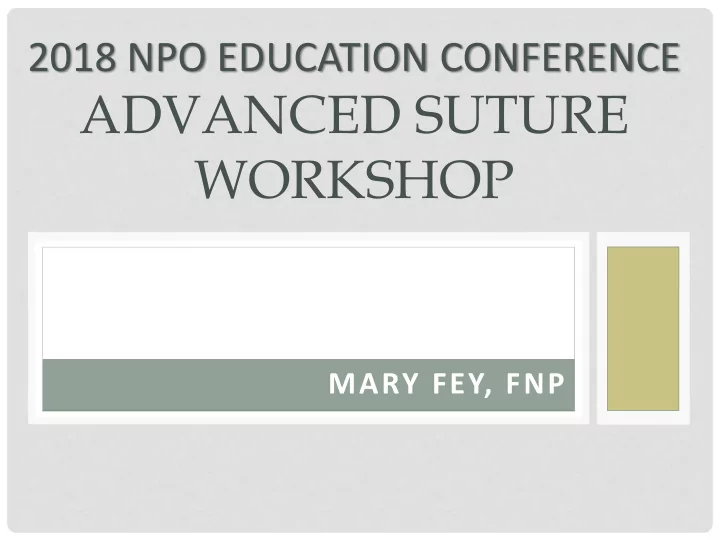

2018 NPO EDUCATION CONFERENCE ADVANCED SUTURE WORKSHOP MARY FEY, FNP
SIMPLE VS COMPLEX WOUNDS Complex (deep) wounds require secondary closure: Closes ‘dead’ space Decreases skin tension Bury knot in bottom of wound to not interfere with epidermal healing
COMPLEX WOUNDS Require use of absorbable suture
ABSORBABLE SUTURE APPLICATIONS Inside Mouth Vulva (Biopsies) Layer Closure
LAYERED CLOSURE Deep wounds Subcutaneous involvement Closes dead space Reduces tension Close with simple interrupted sutures of dermis 3 Knots Place about 1 cm apart
BURIED SUTURE
DERMAL (BURIED) SUTURE Insert needle in dermis (deep) and direct TOWARD skin surface, exit at dermal-epidermal junction Then insert needle on opposite side near dermal- epidermal junction, directly across from point of exit Complete suture loop in dermis (deep), directly opposite the origin of the loop Tie the knot (no more than 3 knots) Cut suture close to knot (no long tails) Place as few sutures as possible
B URIED S TITCH B ELOW R UNNING S UTURE A BOVE
CORNER STITCH “BOAT IN THE DOCK”
C ORNER S TITCH H ALF - BURIED HORIZONTAL MATTRESS • Start suture in epidermis across from flap • Insert needle into dermis only and come out in dermis • Assure you have a ‘good bite’ • Exit through dermis very near insertion point • Apply sufficient tension to pull flap into corner • Tie knot across from corner of flap
VERTICAL MATTRESS
VERTICAL MATTRESS Useful for wounds under tension Can use in center of wound
VERMILLION BORDER
LIP LACERATION Proper Technique First suture placed at edge of vermillion border Can use absorbable suture through lip
SUBCUTICULAR RUNNING SUTURE Possible with straight simple facial wound Useful for facial wounds for cosmetic reasons Sutures not visible Anchor suture at one end with one tied loop or can use a bead to hold suture Reinforce with steri-strips
HORIZONTAL MATTRESS Good for large wounds with tension Leaves more scarring Don’t use this stitch often
HORIZONTAL MATTRESS
Recommend
More recommend